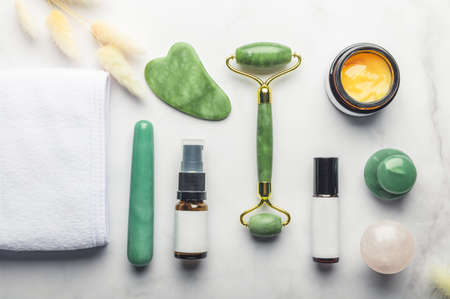1. Retinol and Retinoids
When it comes to anti-aging skincare, retinol and retinoids are often the first ingredients dermatologists recommend—and for good reason. These Vitamin A derivatives have been extensively studied and are proven to deliver visible results over time.
What Are Retinol and Retinoids?
Both retinol (available over-the-counter) and retinoids (typically prescription-strength) are forms of Vitamin A. They work by speeding up cell turnover, which means they help your skin shed old, dull cells more quickly and replace them with fresh, new ones.
How They Help with Aging
As we age, our skin’s natural renewal process slows down. Retinoids help jumpstart that process again. Here’s what they do:
- Boost collagen production: Collagen is what keeps our skin firm and plump. Retinoids stimulate collagen growth, helping reduce sagging and wrinkles.
- Smooth fine lines: By increasing cell turnover, retinoids help fade fine lines over time for a smoother texture.
- Improve skin tone and texture: They can also help even out pigmentation and make skin look more radiant overall.
Retinol vs. Prescription Retinoids
| Type | Strength | Availability | Best For |
|---|---|---|---|
| Retinol | Milder | Over-the-Counter | Sensitive or beginner skin |
| Tretinoin (Retin-A) | Stronger | Prescription Only | Moderate to advanced aging concerns |
| Adapalene (Differin) | Mild to moderate | OTC & Prescription | Acne-prone and aging skin |
Tips for Using Retinoids Safely
- Start slow: Use it 2–3 times a week at night and gradually increase as your skin adjusts.
- Always wear SPF: Retinoids can make your skin more sensitive to the sun.
- Avoid mixing with strong actives: Don’t combine with exfoliants or Vitamin C in the same routine unless advised by a dermatologist.
- Moisturize well: Use a gentle moisturizer to combat dryness or irritation during the adjustment period.
If youre serious about fighting signs of aging, retinol or a retinoid may be just what your routine needs. Theyre powerful, backed by science, and favored by dermatologists across the U.S. for their ability to transform the skin over time.
2. Vitamin C
Vitamin C is a dermatologist favorite when it comes to anti-aging skincare—and for good reason. This potent antioxidant not only helps brighten your complexion but also works hard behind the scenes to protect your skin from environmental damage and reduce signs of aging.
Why Dermatologists Love Vitamin C
Vitamin C (also known as ascorbic acid) is one of the most researched and trusted ingredients in skincare. It’s especially praised for its ability to:
- Brighten Skin Tone: Helps fade dullness and gives your skin a more radiant glow.
- Reduce Hyperpigmentation: Targets dark spots, sun spots, and uneven skin tone caused by sun exposure or acne scarring.
- Protect Against Free Radicals: Acts as an antioxidant shield against pollution, UV rays, and other environmental stressors that accelerate aging.
How It Works
Free radicals are unstable molecules that can damage skin cells and speed up the aging process. Vitamin C neutralizes these harmful molecules, helping to slow down visible signs of aging like fine lines, wrinkles, and sagging skin. It also plays a role in collagen production, which keeps your skin firm and youthful.
Choosing the Right Vitamin C Product
Not all Vitamin C products are created equal. Here are some tips for picking an effective formula:
| What to Look For | Why It Matters |
|---|---|
| L-ascorbic acid (10-20%) | The most effective form of Vitamin C at concentrations ideal for visible results without irritation. |
| Dark or opaque packaging | Protects the formula from light and air, which can break down Vitamin C and reduce its potency. |
| Added antioxidants (like Vitamin E or Ferulic Acid) | These boost the stability and effectiveness of Vitamin C. |
Pro Tip from Dermatologists
For best results, apply Vitamin C serum in the morning before sunscreen. This combo provides double protection against UV damage throughout the day.

3. Peptides
If youre looking for a way to keep your skin firm and youthful, peptides are a must-have ingredient in your anti-aging routine. These small chains of amino acids are the building blocks of proteins like collagen and elastin—two essential components that give your skin its structure and elasticity.
How Peptides Work
As we age, our bodies produce less collagen and elastin, leading to sagging skin, fine lines, and wrinkles. Peptides help by sending signals to your skin cells to boost production of these proteins. Think of them as messengers that tell your skin to repair itself and stay strong.
Main Benefits of Peptides
| Benefit | Description |
|---|---|
| Firmer Skin | Stimulates collagen production to improve skins firmness and elasticity. |
| Smoother Texture | Reduces the appearance of fine lines and wrinkles over time. |
| Improved Barrier Function | Helps strengthen the skins natural barrier, making it more resilient. |
| No Irritation | Mild on sensitive skin compared to some other active ingredients like retinol. |
Types of Peptides You Might See on Labels
- Copper Peptides: Known for wound healing and boosting hair growth as well as skin regeneration.
- Signal Peptides: Trigger collagen and elastin production.
- Carrier Peptides: Deliver trace elements like copper to the skin.
The Bottom Line on Peptides in Skincare (Not a Conclusion)
If youre not already using a peptide-rich serum or moisturizer, now’s a great time to start. Dermatologists love peptides because they work well with most skin types and can be layered easily with other skincare ingredients. Look for products that list peptides high up on the ingredient list to make sure youre getting a good dose.
Your skin does a lot for you—give it some support with peptides so it can keep looking fresh, firm, and fabulous.
4. Hyaluronic Acid
If your skin ever feels dry, tight, or looks a little dull, hyaluronic acid might be your new best friend. This powerhouse ingredient is naturally found in our bodies and is famous for its ability to hold up to 1,000 times its weight in water. That means it helps keep your skin hydrated, plump, and smooth—exactly what you want when trying to fight signs of aging.
Why Dermatologists Love It
One of the top reasons dermatologists recommend hyaluronic acid is because its gentle yet effective for almost every skin type—even sensitive skin. As we age, our natural levels of hyaluronic acid decrease, which can lead to dryness and more visible fine lines. By adding this ingredient back into your skincare routine, youre giving your skin the moisture boost it needs to look fresher and more youthful.
How It Works
Think of hyaluronic acid like a sponge that pulls moisture into the skin and locks it in. This deep hydration helps fill out fine lines caused by dehydration, making them less noticeable and giving your skin a smoother appearance overall.
Benefits of Hyaluronic Acid at a Glance
| Benefit | Description |
|---|---|
| Deep Hydration | Attracts and retains moisture in the skin |
| Plumps Skin | Helps reduce the appearance of fine lines caused by dryness |
| Gentle on Skin | Suitable for all skin types, including sensitive skin |
| Improves Elasticity | Supports a firmer, more youthful look over time |
Pro Tip:
For best results, apply hyaluronic acid to slightly damp skin and follow with a moisturizer to lock in hydration.
5. Niacinamide
Niacinamide, also known as vitamin B3, is a true skincare multitasker that dermatologists often recommend for aging and sensitive skin. It’s gentle, effective, and suitable for almost all skin types—even those prone to redness or irritation.
What Makes Niacinamide So Special?
This powerhouse ingredient helps address multiple signs of aging without causing dryness or peeling. Here’s what it does:
- Boosts Skin Elasticity: By supporting collagen production, niacinamide helps firm up sagging skin and reduce the appearance of fine lines.
- Fades Dark Spots: It works to even out skin tone by slowing down pigment production, making it great for sun spots and age spots.
- Strengthens the Skin Barrier: Niacinamide helps your skin retain moisture and defends against environmental stressors like pollution and UV damage.
How Niacinamide Compares to Other Anti-Aging Ingredients
| Ingredient | Main Benefits | Skin Type Compatibility |
|---|---|---|
| Niacinamide | Improves elasticity, fades dark spots, strengthens barrier | All skin types, including sensitive |
| Retinol | Speeds up cell turnover, reduces wrinkles | Normal to oily; may irritate sensitive skin |
| Vitamin C | Brightens skin, boosts collagen | Most skin types; can be unstable in some formulas |
Tips for Using Niacinamide in Your Routine
- Look for serums with 5%–10% niacinamide concentration for best results.
- You can layer it with other ingredients like hyaluronic acid or peptides.
- Avoid combining it directly with strong acids (like AHAs/BHAs) unless your skin tolerates it well.
Pro Tip:
If you’re new to anti-aging products, niacinamide is one of the easiest ingredients to start with. Its gentle yet delivers visible improvements over time—think smoother texture, more even tone, and a healthy glow that lasts.


